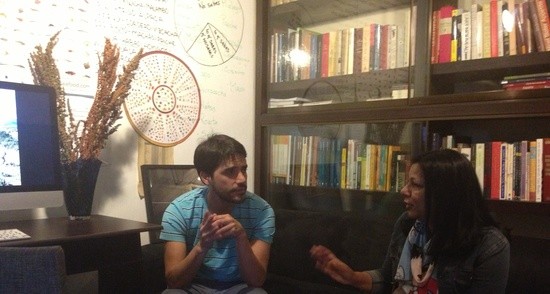
Every Monday, Clay Oven Irvine executive chef/owner Geeta Bansal shares an interview that she's done with some of the heavyweights of European cooking. Today, she regales us with a visit to Peru, where Virgilio Martinez is currently the toast of the country's cooking scene. Enjoy!
]
Virgilio Martinez Veliz, The Chef at the Forefront of the Peruvian Culinary Metamorphosis
By Geeta Bansal, Executive Chef, Clay Oven Irvine
Virgilio Martinez Veliz is an energetic, young, handsome, introspective, accomplished chef and restaurateur with restaurants in Lima and Cusco, Peru and in London since last year. I first met him for a conversation at his restaurant Central in the posh Miraflores district of Lima. We sat down in the library upstairs, which his restaurant guests are allowed to reference. Adjacent to that is a small roof top garden that grows herbs and garnishes for the kitchens below. In the kitchens downstairs the staff was working feverishly to finish the prep for the day's service. His restaurant is the newest entry into the top 50 restaurants of the world at the Restaurant Magazine awards ceremony in London on April 29th, 2013–a great accomplishment, considering he opened the restaurant in 2010.
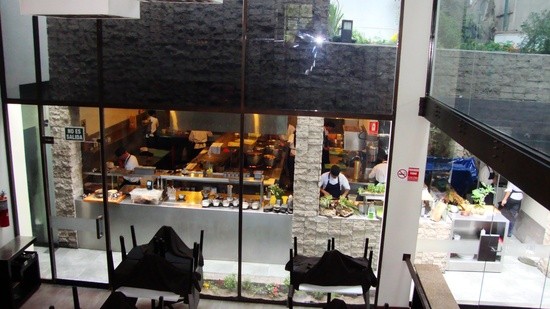
Virgilio grew up in a well-to-do family that allowed him to get a great education (a law degree, no less) and travel and explore the world before finding his calling in the kitchen. I had heard a lot about Virgilio the person from other chefs and friends and was looking forward to meeting this young chef. Our meeting had been planned in the morning before the lunch service at his restaurant for an hour but we ended up chatting about food and people we knew for a long time and on my last night in Lima I had a wonderful meal there which for me still brings back memories of the great food in Peru.
There is a great food culture there with Japanese, Chinese, Italian and Spanish influence in combination with the most unusual products from the Amazon to the Andes. At the moment it is the hottest gastronomic destination for food aficionados, at the forefront of the changing face of cuisine in South America. Every chef I meet or have met in the last few years has either been there or wants to (Joan Roca of Celler Can Roca, Aduriz of Mugaritz, Albert Adria of 41 degrees and Tickets, Elena and Juan Mari Arzak, Carme Ruscalleda, etc).
As a result I had heard all about chef Virgilio's culinary history. including his professional skateboarding days, his Cordon Bleu training in Canada, his work at the Astrid y Gaston restaurant in Lima (Gaston Acurio's flagship in Lima). He had also headed the kitchen at Acurio's ventures in Madrid and Bogota. The day before we met he had returned from Lisbon where had participated in a food conference and last week he was in London where his restaurant Lima his newest venture is located, for the restaurant awards ceremony at the London Guildhall.
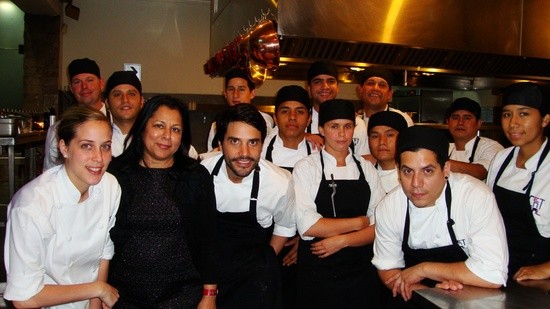
Virgilio recently launched his Mater initiative where he is working on bringing back and preserving the indigenous products from the different ecosystems that exist in his homeland and using them in his haute cuisine. (The newest chef trend that I have observed, Alex Atala of Brazil launched ATA last year, Redzepi has his Nordic foodlab).
The products from the Amazon, the Andean highlands, the coast and the desert a huge range of indigenous plants, animals and fish are the focus of this initiative. These forays added to his travels and work experience in Southeast Asia, Spain, Italy, South America, New York (Lutece), and France has given him a wider perspective on where he will be taking Peruvian food next. In my conversations with the grand masters of cuisine in Peru such as Javier Wong and Toshiro, he was always mentioned in glowing terms and identified with the future of the national cuisine.
Virgilio's cuisine is fresh, and contemporary with beautiful plates and very representative of his culture. The flavors and textures create memories for your taste buds; each delectable bite surpasses the last one. There came a point during my meal where I gave up trying to identify the techniques and flavors and became just an enraptured diner enjoying a great experience. He is assisted by Pia, his gorgeous partner and chef in the kitchen and they make a great team (wedding bells are around the corner for this young couple). There is a lot of energy and creativity in this duo that is due to explode on the international scene. Since last year Virgilio has been traveling to and speaking at a lot of events nationally and internationally (all these young chefs must be racking up a gazillion air miles with the trips they take constantly across continents…I should ask what they do with all those miles!) I have also visited his Cusco restaurant Senzo at the Palaccio Nazarenes hotel, Orient Express's newest hotel venture where the kitchen is run by Karime, a young petite Mexican chef. The food at Senzo is spectacular as well and true to Virgilio's vision.
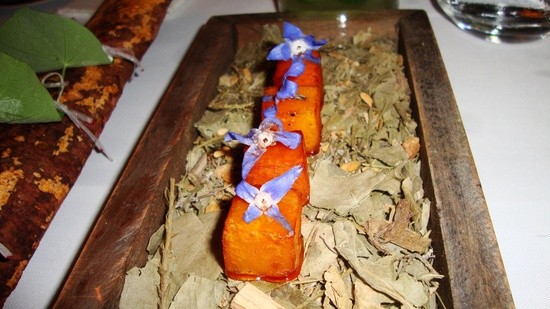
My motivation for these interviews is to share my experiences of meeting and knowing these wonderful cooks in my attempt at connecting them with diners so they know them and the way they think and work and can relate to their food.
The menu at Central is divided into two sections. The Diversity showcases products from the Amazon to the Madre de Dios to Central Andes. The Experience Origin has ten courses with scallops, fish, algae, octopus, shrimp, goat, suckling pig, arapaima fish from the Amazon, bahuaja nuts to the last named tea time with an assortment of sweet delectables. The pictures don't do justice to the aromas and colors of these dishes but will make you want to be there yourself to experience them.
Our conversation which I hope will be continuing for a long time:
How do you define your style of cuisine?
My cuisine is inspired by the different regions of Peru. I know I am in an urban area here in Lima, yet I am very close to the sea, only two blocks away and the sea inspires me on a daily basis. My food is very visual, to me landscapes, feelings, romance, emotions are very important. I believe that my cuisine is very close to nature but in an artistic way.
So you go out to pick your own products or forage as the current trend now?
Firstly, I keep in touch with my producers. As you say, it is a trend now, but we do our best not to follow it. There are other trends as well to bring emotions and spirituality into food and that is significant as well. Every where people are aware of our culture and how it is becoming too artificial and we need to go back and reconnect emotionally. We need this balance and I see it as the new trend.
Do you think you set trends as people are following your lead now?
We are just trying to do something unique. I don't know how to classify our style; our commitment is to do something unique. My education as a cook was all over the world and when I got back to Peru five years ago my mission was to look into my heritage. I started to travel around Peru to identify the products and get to know people. This process led to the creation of my cuisine. It is a Peruviana cuisine and we use 100% Peruvian products and I am very proud of that.
Is it important to look to the past to create the future?
I think we must live in the moment not in the past or future or we will become static or immobilized. Once in a while we can meditate and become aware of something in the past that you can bring it into the present.
What is your Mater initiative about?
To discover the unknown, forgotten things in the jungles and the Andes Mountains of Peru. As a cook we don't have the ability to know the product, the producers, the soil, so we are working with people who are knowledgeable about it.
So like collaborating with cultural anthropologists?
I just had a meeting with anthropologists, biologists and designers this morning on this subject. We have travelled to the Andes, the jungle and met the people and came back with samples and data to send to the lab for analysis.
We must know the true nature of these products before we use it in our kitchens to make sure it is not unsafe for consumption. (Hey, I ate a kind of bacteria at both his restaurants so I am glad to know it was tested out). The Amazon for example has several micro-climates so all kinds of mushrooms grow there and not all are safe to eat. I respect the traditional products and the knowledge about traditional food styles but as you know our food is not traditional. We take a product and use it differently but we respect where it comes from. The soil is our God, where all these things come from and we must do our best not to damage it and maintain its true nature
For the last decade the emphasis has been on molecular cuisine. Do you see it changing?
We cooks believe in techniques, sometimes for the sake of our own egos. That stage helped us a lot to think about transforming things in nice artistic ways, stress hygiene, to set new standards in the cuisine globally. All the foams and spumas are now as commonplace as mayonnaise.
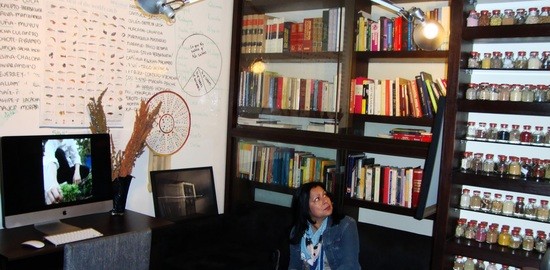
Are you a perfectionist by nature, detail oriented?
At this stage we have to be like this as I am in charge of this restaurant I have to keep the focus. This is a work with a lot of details and a lot of people sit down at our tables for 3-4 hours and they are expecting the best. We cannot afford to make mistakes. There is a lot of emotional expectation and I must honor them with the best and with perfect details.
Has the Internet changed diner's expectations since everything is shared instantly all over the place?
It's crazy because we have no answers and we don't know where or who is interacting with us. We make friends on face book, online and twitter. It is handy but it does not show the extent of our work. It is a small glimpse only. It's like when journalists call me or Skype an interview but it's not the same as here we are talking and getting a different feeling by being face to face. You are not a journalist and are writing from another approach and it is interesting to have this interaction with you.[
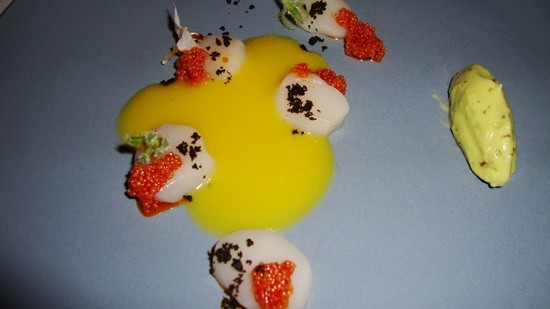
Any specific ingredient you brought back into use in the kitchen?
We are using stevia in its natural form, since earlier it was used in the powder form as a sweetener. (I told him about the stevia plant in my garden and he was surprised) That is why we started the Mater initiative. We started exploring grains from quinoa to kiwicha to amaranth. Now quinoa is everywhere and even the price has started going up. We forgot we have a native tomato (it's called a false tomato) and are now rediscovering it. Potatoes and corn is another example. There are hundreds of varieties of corn but we only use a few so now we use many more. We only use the freshest produce. Purple corn was only used to make chicha and we use it differently (even as a bread at Central). This corn is very hard and that's where technique and science comes in to make it usable for other forms.
Do you have an R&D facility?
My sister is a physician and has a circle of scientist friends who help us. Right now for our Mater initiative we are getting a land lot in Cusco to be able to focusing on registration of products because some of them don't even have names.
So you are going to be name products? It's interesting because maybe hundreds of years from now archaeologists might find evidence of your work on it?
We have a huge commitment to this project. When you are 5000m above sea level in the Andes you find an indigenous community living there and find products that are great but they are not using them so we can share our knowledge with them of how to make them usable. They are surprised sometimes; we prepare it and show them. It has taken us time to realize that food is the focus of our work in the restaurant and business part of it comes later. The first year we were lost but now we are settled in and focused.
It's like anything else. Wen you were a skateboarder it took time to get a move polished and it's the same with your cuisine. Does that part of your life help you in what you do now?
I love it because since I was eight I was on the streets of Lima with my skateboard, moving from one part of Lima to another, talking to people eating the street food. My father is a lawyer and the only way he got a chance to talk to me was by meeting me in a restaurant. I would come into a high end restaurant on my skateboard to meet him. It was two extremes, being on the street and being in a posh restaurant. We kids were on the streets looking for a new location to practice our art and I got to know my city as a young child. Now we are still using that curiosity and knowledge in the kitchen.
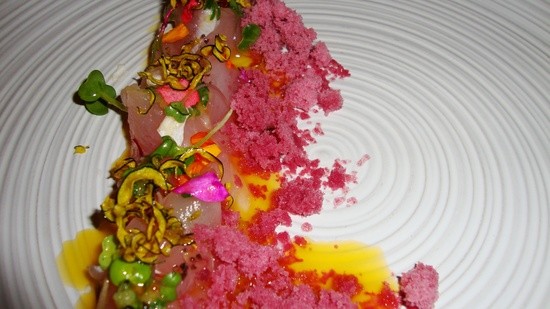
Do you think culinary training is important for cooks?
It is but it is not always the case. When I have people join me I don't ask so much about training. I want to know if they have a passion, if they are a good person. We have 60 people in this restaurant and we need to be able to trust people and depend on them. A CV with a lot of schools, programs, training etc is not so important.
Do you think where they trained or staged is important?
Yes I do. That way they have learned practically.
Who do you admire as a chef?
You were talking about Andoni Aduriz and he is an inspiration. Joan Roca, very gentle, fatherly, and kind. There are lots of chefs in France, Michel Bras etc. I respect others and have been to their restaurants like Pascal Barbot. He is very nice and down to earth and easy to talk to and his food is perfect (We spoke about women in the industry, especially Carme Ruscalleda and Elena Arzak and how we admired them mutually). Magnus Nielson of course. I respect him because though he is totally against the kind of cuisine I do, he hates vacuum packs, plastic bags etc, and he has his own point of view and is not afraid to talk about it. People like him make us think about our food how we can change it for the better. I also admire Eneko Atxa (Azurmendi, Spain); he is really good.
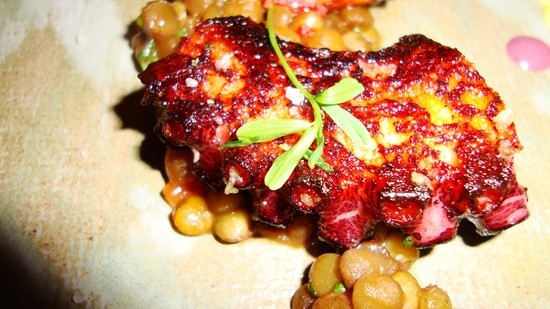
That brings me to what you think about women in the kitchen, considering you have Pia alongside you here and you have Karime running the kitchen at Senzo in Cusco?
I think Karime is the only one in Peru right now (laughing). Pia is truly passionate about her work. We need more women in the kitchen. I am surrounded by women myself. I work with my sister, my general manager is a women, Pia (his fiancé who also trained with Joan Roca at El Celler de Can Roca) Karime, my mother (who was involved in the stunning design of the restaurant). I am taking more advice and sophistication from them, though I am the face of the restaurants, their opinions are important in our work. (We spoke about my philosophy of Indian cuisine and use of Ayurvedic principles and we are continuing our exchange of ideas)
What do you think of your work being copied by other chefs?
I think for me it is a kind of honor. I say “Wow.” I have seen it before till I finally place it in my own work. Younger chefs get concerned but as you grow in this profession you take it in stride. It is ok to be inspired but not copy everything blindly.
Do you constantly revisit your recipes to tweak them because I do that all the time?
All the time, because I want to keep it original and anyway we change the menu all the time. We change the menu based on what arrives in our kitchen in the morning. Sometimes we have regular clients and they like the same thing all the time so we keep those the same. We need to take of these regulars because they have believed in us from the beginning even supported us in difficult times (his restaurant was once closed for a few months due to permit problems).
Peruvian is the most popular cuisine in the world right now but which other cuisine interests you?
For me China and the cuisine there is of great interest. Japan and China both have very long cultural histories. We are curious about other things. We have so many influences in our cuisine in Peru from Japan, China, Spain etc. And I would love to go to India.
You know when I go back to California I am doing a pop up with Indeii cuisine?
What's that?
That is a cuisine I have named myself. If there can be Nikkei cuisine (Japanese-Peruvian) why not Indeii? (We had a good laugh at that. Virgilio thought it was a good line.)
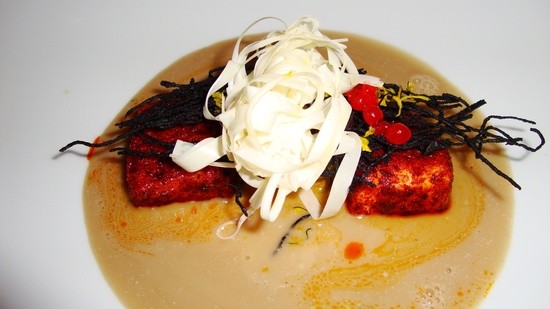
What is your opinion about Peruvian food outside of Peru. You have your own Lima restaurant in London?
Peruvian food is very popular, everyone wants to come here or eat Peruvian food but we need to be careful. We need to investigate more and do more research. Every week we get proposals to open elsewhere in great hotels etc but we need to be careful about that. If we want to promote and expand Peruvian cuisine and don't have the knowledge we end up giving an improper impression. We have to go slow.
How about chefs attending seminars all over the world and traveling all the time (This as we are both going to Mesamerica in a month)? How much time it takes away from the kitchen?
Actually it is my problem right now I was in Lisbon last week, then in two weeks in London. Then Mexico….
Do you agree that chefs need to be in their kitchens more?
Yes, because when people come they expect to see me and I am surprised sometimes when I go into the dining room to say hello and people are happy to find that I am actually there. I want to spend more time in my kitchen.
Last week I spoke with Mr. Gagnaire and he was not partial to the idea of taking time away from work. Are you going to do this less often in the future?
There are many opinions about this. We work a lot here sometimes from 7 in the morning till 2 at night and do many different things. So when I travel for example to Melbourne I can tell people more about what is going on in our food in Peru. You learn a lot from other chefs you meet there. Sometimes people tell me you don't talk about yourself or your restaurant you just talk about Peru. I do that because I want to talk about my culture.
Do you get inspired by other chefs you meet there?
I do and I learn a lot. It is great to have long interesting conversations with other chefs and to learn about their work and techniques.

Do you think becoming a cook is a glamorous profession right now?
Yes, in this culture people like to be seen and become popular. In this country if we pursue that line of thought we will create resentment amongst other artists in society who's work is on a whole different level. Young people must understand the hard work involved in the kitchen and know the reality of this life and not be dazzled by the projected glamour.
Now you have many other chances of being in this business you can be in the sala, manager, sommelier, food photographer, food stylist etc. Earlier you could only be a cook. Many times people say why so and so is the cover of a magazine and I want to be there too and they want to be chefs without realizing the hard work it takes.
Any cookbook in the works?
I have something in the works but it's not going to be a typical me book or about Central. I am in love with our landscapes and culture and it is going to be more in that direction. Right now there is a lot of interest in nature because our world is becoming too plastic and we want to reconnect with nature. It's not just happening in food but it is happening everywhere.
Do you think our lives are becoming robotic?
Yes because your whole schedule is so programmed. We need balance, these are the next trends coming up.
Which cities have you visited in the US?
I will be going to New York this fall. I have been to San Diego more because I have family there. So next time I will come up north and see you. (That is how the conversation moved to the theory of six degrees of separation)
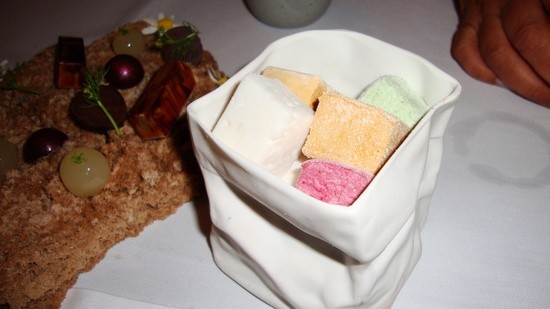
We spoke about spirituality, destiny and the theory of six degrees of separation in the way our paths had crossed in life and how strangely I was there talking to him because of people we knew in common. We spoke about Ivan Kisic and how Virgilio would have been on that fateful trip with him when died if he (Virgilio) had not changed his plans because of work. They had been roommates in London and they had grown up in the same town and were good friends. I was in Peru indirectly because of Ivan as I was friends with his twin brother.
He is a very interesting and normal guy and I hope he stays that way after all the accolades and awards coming his way. So far he is untainted by his incredible success. We discussed everything from all the kitchens we had both visited, the smallest to the one of the largest at Per Se, effect of global fiscal problems on business. Our conversation continued for a long time and we talked about all the people we know in common, about awards, about family, about life.
I am so looking forward to seeing him again later this year and exploring my Indian cuisine further. This cool young guy is on a special journey to change the perception and form of Peruvian cuisine and Central should definitely be on your itinerary on a trip to Lima, Peru.
Follow Stick a Fork In It on Twitter @ocweeklyfood or on Facebook! And don't forget to download our free Best Of App here!

